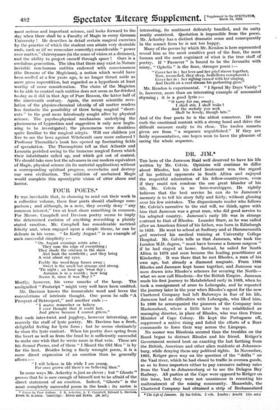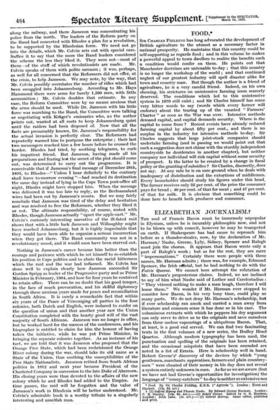DR. JIM.*
THE hero of the Jameson Raid well deserved to have his life written by Mr. Colvin. Opinions will continue to differ about Rhodes, but his chief lieutenant won the regard of his political opponents in South Africa and enjoyed the respectful admiration of his fellow-countrymen, even if they could not condone the one great blunder of his life. Mr. Colvin is no hero-worshipper. He rightly believes that the best service he can do to Jameson's memory is to tell his story fully and fairly, without glossing over his few mistakes. The dispassionate reader who follows Mr. Colvin's narrative to the end will, we think, agree with him that Jameson was a great man, who did good service to his adopted country. Jameson's early life was in strange contrast to that of Rhodes. Leander Starr, as he was called after an American friend of his father, was born in Edinburgh in 1853. He went to school at Sudbury and at Hammersmith and received his medical training at University College Hospital. Mr. Colvin tells us that Jameson, who took the London M.D. degree, " must have become a famous surgeon " if he had stayed at home. Instead, he sailed for South Africa in 1878 and soon became the leading practitioner at Kimberley. It was there that he met Rhodes, a man of his own age, but already a diamond magnate. From 1886 Rhodes and Jameson kept house together, and Jameson was soon drawn into Rhodes's schemes for securing the North— what we now call Rhodesia—for the British Empire. Jameson made his first journey to Matabeleland early in 1889, when he took a consignment of arms to Lobengula, and he repeated the journey later in the year when Rhodes's agent for the new Chartered Company had left Buluwayo in fear of his life. Jameson had no difficulties with Lobengula, who bled him. In 1890 he accompanied the pioneers of the Company into Mashonaland, where a little later he was established as managing director, in place of Rhodes, who was then Prime Minister of Cape Colony. He kept the Portuguese off, suppressed a native rising and foiled the efforts of a Boer commando to force their way across the Limpopo.
No sooner was Rhodesia secured than the troubles on the Rand began to distract Rhodes and his friend. Kriiger's Government seemed bent on exacting the last farthing from the British, American and other alien residents at Johannes- burg, while denying them any political rights. In November, 1895, Krfiger gave way on the question of the "drifts " on the Vaal river, which he had closed to traffic in oversea goods, so as to force importers either to pay excessive railway rates from the Vaal to Johannesburg or to use the Delagoa Bay Railway. All parties at the Cape were opposed to Krfiger on this issue, but they were not unanimous in resenting his maltreatment of the mining community. Meanwhile, the Chartered Company had obtained a strip of Bechuanaland- The Lift of Jameson. By Ian Colvin. 2 vols. London : Arnold. 1328. net.) along the railway, and there Jameson was concentrating his police from the north. The leaders of the Reform party on the Rand had concerted with Rhodes a plan for a revolution, to be supported by the Rhodesian force. We heed not go into the details, which Mr. Colvin sets out with special care. Suffice it to say that the more the Rand leaders considered the scheme the less they liked it. They were not—most of them—of the stuff of which revolutionists are made. Mr. Colvin speaks of them with polite sarcasm ; it was, perhaps, as well for all concerned that the Reformers did not offer, at the crisis, to help Jameson. We may note, by the way, that Mr. Colvin possibly overstates the number of rifles which had been smuggled into Johannesburg. According to Mr. Hays Hammond there were arms for barely 1,500 men, with little ammunition ; Mr. Colvin doubles that estimate. In any case, the Reform Committee were by no means anxious that the arms should be used. While Dr. Jameson with his little force was marching to the Rand, the 'Committee were talking or negotiating with Krliger's emissaries who, as the author points out, wanted at all costs to keep Johannesburg quiet until the raiders had been disposed of. Now that all the facts are presumably known, Dr. Jameson's responsibility for the actual invasion is perfectly clear. The Reformers had repeatedly warned him to postpone the enterprise ; their last two messengers reached him a few hours before he crossed the border. Rhodes had tried, by soothing telegrams, to curb his impatient friend. But Jameson, having made all his preparations and fearing lest the secret of the plot should come out, was determined to carry out the programme. It is conceivable that if Jameson's final message of December 28th, 1895, to Rhodes—" Unless I hear definitely to the contrary shall leave to-morrow evening "—had reached its destination the same day instead of lying in the Cape Town post-office all night, Rhodes might have stopped him. When the message was delivered it was too late to reply, as the Bechuanaland wires had been cut by Jameson's scouts. But we may fairly conclude that Jameson was tired of the delay and hesitation and was resolved to free the Reformers, whether they liked it or not. The ultimate responsibility, of course, rested with Rhodes, though Jameson actually "upset the apple-cart." Mr. Colvin's curiously interesting narrative of the ill-fated raid shows that with a little luck Jameson and Willoughby might have reached Johannesburg, but it is highly improbable that they would have been able to organize a serious insurrection when they got there. The Rand community was not in a revolutionary mood, and it would soon have been starved out.
Nothing in Jameson's career became him better than the courage and -patience with which he set himself to re-establish his position in Cape politics and to abate the racial bitterness which the raid and the war had inflamed. Mr. Colvin has done well to explain clearly how Jameson succeeded Sir Gordon Sprigg as leader of the Progressive party and as Prime Minister in February, 1904, and how for four years he contrived to retain office. There can be no doubt that his good temper, in the face of much provocation, and his skilful diplomacy through these anxious years made for peace and reconciliation in South Africa. It is surely a remarkable fact that within six years of the Peace of Vereeniging all parties in the four colonies, both Dutch and English, were induced to confer on the question of union and that another year saw the Union Constitution completed with the hearty good will of the vast majority of South Africans. Jameson was no longer in office, but he worked hard for the success of the conferences, and his biographer is entitled to claim for him the honour of having taken the initiative, while he was yet Prime Minister, in bringing the separate colonies together. As an instance of his tact, we are told that it was Jameson who proposed that the Orange Free State, which had been rechristened the Orange River colony during the war, should take its old name as a State of the Union, thus soothing the susceptibilities of the Free State Nationalists. Jameson retired from South African politics in 1912 and next year became President of the Chartered Company in succession to the late Duke of Abercorn. His closing years were thus devoted to the .affairs of the new colony which he and Rhodes had added to the Empire. As time passes, the raid will be forgotten and the value of Jameson's work in Rhodesia will be better understood. Mr. Colvin's admirable book is a worthy tribute to a singularly interesting and- unselfish man.



































































 Previous page
Previous page